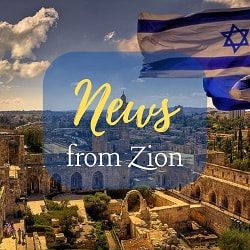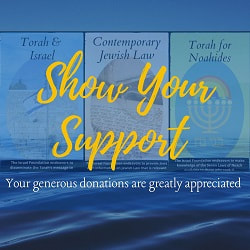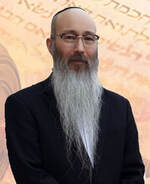|
By: HaRav Menashe Sasson Reporting from Jerusalem, Israel Published in the U.S.A. The Torah is a book that is intended to introduce Jews the various laws which HaShem established for the conduct of both the Jewish people and the Jewish nation. Laws for the Jewish people include, for example, laws relating to Shabbat, the holidays, and religious ritual practices. Laws for the Jewish nation include, for example, laws relating to kings and wars and the administration of criminal and civil justice. Therefore, one might reasonably ask, why does the Torah begin with the story of creation: “In the beginning, HaShem created the heaven and the earth [בראשית ברא אלהים את השמים ואת הארץ],” rather than with the first misva in the Torah, Rosh Hodesh, the establishment by the Sanhedrin (the Jewish “Supreme Court”) of the New Month and, by extension, the establishment of the Jewish calendar which, in turn, establishes the day on which the various holidays will be observed in a given year? Rashi, a renowned commentator on Torah, in what is perhaps his most well-known elucidation of a pasuk in the Torah, asks “[w]hat is the reason that HaShem began [the Torah] with Sefer Bereshit?” Rashi, quoting the Midrash, then answers, saying the reason is:
Rashi, Bereshit 1:1. Thus, we see that the message of Sefer Bereshit – is that HaShem gave Eretz Yisra’el to the Jewish people and that HaShem declared – “[t]he strength of His deeds He declared to His people. . . .” – is addressed not to the gentile nations, but, rather, to the Jewish people! The obvious question is, “since HaShem gave Eretz Yisra’el to the Kena’anite nations and then took it away from them and gave it to the Jewish people as an inheritance, in other words, forever, why did HaShem direct His message to the Jewish people (“[t]he strength of His deeds He declared to His people. . . .”) and not to the gentile nations? The answer is that HaShem knew that the Jewish people might feel guilty about having acquired Eretz Yisra’el by conquest. Thus, the Torah begins with telling the story of the creation of the world to prove – not to the gentile nations but to the Jewish people – that Eretz Yisra’el belongs to whomever HaShem chooses to give the Land, and that HaShem chose to give Eretz Yisra’el to the Jewish people. Bereshit Rabba 1:2. Applying this concept to contemporary times, the reason many gentile nations do not accept that Medinat Yisra’el and the Jewish people are the rightful owners of geographic areas such as Judea, Samaria, Golan, and Gaza, is because of the failure of Medinat Yisra’el to assert sovereignty over these areas. The stated reason Medinat Yisra’el has given for not exercising sovereignty over the entirety of Medinat Yisra’el is that if it were to do so, the change in demographics would result in Arabs constituting an unacceptably large percentage of the country’s population. This objection, however, is easily resolved. The legal documents relating to the political nature of Medinat Yisra’el provide that the country is both a “Jewish state” and a “democracy.” The only way a Jewish state can be a democracy is if Jews, and only Jews, possess political rights (e.g., the right to vote, to hold public office, etc.). If it were any other way, the country would not be a “Jewish state.” An American-style “melting pot” composed of Jews and non-Jews does not a Jewish state make, especially if non-Jews can, through a democratic process, change the character of the country by voting to make the country a “Palestinian,” Muslim, or some other type of non-Jewish state. Furthermore, continuing a failed policy of refusing to exercise sovereignty over geographic areas in which large numbers of non-Jews reside, in an effort to prevent Jews from becoming a minority, only “kicks the can down the road,” leaving the problem to be solved in the future. Such a policy, of course, whether in one’s personal life or on a national scale, always makes a problem harder and more expensive to solve, assuming that when the problem finally is addressed “head-on,” the problem is still capable of being solved. Jewish law clearly provides that non-Jews, in general, and non-Jews who seek to annihilate the Jewish people, in particular, may not be citizens of Medinat Yisra’el, Mishneh Torah, Hilchot Melachim u’Milchamoteihem 1:1.b, 5:4, 5:5, 6:1, 6:4 and that non-Jews may not vote or hold public office in Medinat Yisra’el. Id. 1:4, 6:1, 6:4. Thus, the Halakhic answer is clear. Medinat Yisra’el, if it is to survive, must change its present course to one of Torah and Halakha. Specifically, Medinat Yisra’el must begin to save itself by discontinuing its current practice of allowing non-Jews to become citizens, to vote, and to hold any public office or government employment. May HaShem help the Jewish people, both in Medinat Yisra’el and throughout the Diaspora, to not only understand, but to accept in their hearts, that HaShem, the Creator of the Universe, gave Eretz Yisra’el to the Jewish people. May HaShem bless Jews in the Diaspora to make Aliyah en-masse and to then vote for changes that will result in Medinat Yisra’el being a reliable, permanent, and truly Jewish state. And last, but not least, may HaShem bless the Jewish people and their political leaders to be assertive in proclaiming, rather than apologizing for, the fact that HaShem gave Eretz Yisra’el to the Jewish people as an inheritance. שבת שלום Shabbat Shalom! Copyright © The Israel Foundation. All Rights Reserved.
0 Comments
Your comment will be posted after it is approved.
Leave a Reply. |
THE ISRAEL FOUNDATION





